- Home
- Mordecai Richler
The Incomparable Atuk Page 4
The Incomparable Atuk Read online
Page 4
After Atuk had finished his story, Rory sat for a long while, chin cupped in his hands. ‘Give me until tomorrow morning,’ he finally said.
Michele was for it; she went for the indigenous cultural angle. Twentyman, amused, said sure.
Atuk was waiting outside the office at eight o’clock in the morning.
‘All right,’ Rory said. ‘I’ve thought it over. You’re on, but—’
Atuk beamed. He did a happy little dance.
‘—but only if you let me call the shots. We’ve got to play this Rory Peel’s way.’
‘You’re the boss,’ Atuk said immediately.
I certainly am, Rory thought, feeling a sudden surge of confidence. Superiority. After all, he’s only a dumb Eskimo. Almost a coloured man. Rory told Miss Stainsby he was not to be disturbed. He became very masterful, business-like. ‘Number one,’ he said, ‘is there anything in your past we have to worry about?’
Atuk hesitated for only an instant, a suspicious instant, before he smiled and said, ‘No.’
‘Now look here, if there’s anything tell me now. We could be ruined if it came out later.’
I’m safe, Atuk thought. The case was closed long ago. ‘There’s nothing,’ he said. ‘I’m clean as a seal’s tooth.’
‘Seal’s tooth. Very good. Colourful. I want you to stick to that sort of idiom in public, Atuk.’
‘Shit. You’re not talking to a stage Eskimo. Like I don’t rub noses any more, you know.’
‘I’m talking about one thing only,’ Rory said, ‘our business image.’
‘O?,’ Atuk said, ‘sure.’
‘Good. Next question. What about you and Bette Dolan. Is there anything illicit in your relationship?’
‘Bette Dolan,’ Atuk said, aghast.
True enough, Rory thought. Everybody knows she’s frigid.
‘Point number three. There are people we have to watch out for in this town, Atuk. People we don’t want for enemies. Say Seymour Bone and Jean-Paul McEwen.’
‘It is my creed,’ Atuk said, his face shining, ‘that we must love one another or die.’
‘Very good. Nicely put. Now about Bone. He sets the cultural tone in this town. Flatter him. Jean-Paul McEwen will be more difficult.’ Rory broke off. He turned on both water taps in the bathroom, disconnected the phone, lowered the window and turned on the radio. ‘She’s our moral watch-dog sort of. She looks out for lapses in our ethical conduct. Her spies and operatives are everywhere. Disguised too. Take Twentyman, for instance. One day coming out of his club he was stopped by an old cripple with flies on his face. “Dime for a cup of coffee, mister?” Naturally Twentyman brushed the vermin-ridden fool aside. Next morning, opening the paper at McEwen’s column, he reads, “Hard-Hearted Buck Twentyman …” That bitch’s spies are everywhere, Atuk, everywhere. We must be on our guard.’
The next afternoon Atuk signed over twenty-five per cent of Esky Enterprises to Rory. Together they planned the poetry reading at the Cha-Cha-Chow-Mein. The first name to be put on the guest list was that of Professor Norman Gore.
‘Without his help,’ Atuk said, ‘I would be nothing.’
Part 2 Eskimo Tycoon
1
In the unheated cellar of the Cha-Cha-Chow-Mein Restaurant, where group sixty-one met on Thursday nights, no liquor, indeed only Nescafé, was available, but the thoughtful management had set down an empty vodka bottle on each checkered tablecloth that was at least suggestive of hip depravity. A long angular black-haired girl in a loose green sweater and a shiny black skirt climbed on to the high stool to sing Manitob-hi-yay and Goldie buttered a bagel and resumed her knitting.
Goldie Panofsky, plump and rosy-cheecked, wore shimmering golden slacks and a striped lemon blouse buttoned tightly over a generous spill of bosom. Her brown hair was done up in the Bardot-style and her long nails were painted steel-grey. Goldie glared contemptuously at Bette Dolan, seated ringside in a white satin sheath. Then she waved and called yoo-hoo when she spied her father struggling through the darkness, his sociology text books still in hand. ‘Like you’re late, Paw,’ she said.
‘He’s started already?’
‘No. But he hasn’t stopped staring at me all night.’
Panofsky chuckled. ‘Ca, alors,’ he said.
‘Honest, Paw. Like I should drop down dead.’
So Panofsky risked a glance at him – Atuk – and it appeared to be true. The fat brown-skinned hunter with the slit eyes smiled and dipped his head.
‘He recognizes me,’ Panofsky said, ‘from when Professor Gore introduced us.’
‘He’s staring at me. Dig?’
‘Narishkeit.’
Rory approached Atuk, whispered diffidently in his olive ear, and the two men went behind the platform to wait for the long angular singer to step down. Atuk winked at Goldie. Shyly, but unmistakably.
‘Well, Mr Doubting Thomas?’
‘A twitch. He’s nervous. Just look around you, my God!’
There was, it was true, a sense of occasion in the cellar. Atuk, after all, had disappeared from sight for more than a month, and during that time Rory had been busy. Very busy.
Norman Gore waved at Atuk. ‘He looks tired, Nancy,’ the professor said. The current rumour, one among many, was that the Eskimo poet had sent to the Bay for his family and that as many as eighteen brothers, sisters, aunts and cousins were now staying with him. ‘If that’s the case,’ Gore told the party at his table, ‘then his kindness is misplaced. He’s an artist. The burden could crush him.’
Debutantes, young sports car enthusiasts of Forest Hill, students, booking agents for rival coffee bars and delicatessens aside, many of Toronto’s cultural tastemakers sat silent and severe in the darkness. Bushy head of red hair dishevelled, chin sunken to his chest, massive Seymour Bone turned to his wife with a smile. ‘I’m appalled,’ he said, with a sweep of his small melting hand, ‘histrionically speaking, even on the level of …’
‘Darling,’ his wife said, ‘your tie,’ and while he feigned disinterest she wiped his chin with her handkerchief.
Harry Snipes scrawled notes hurriedly with a pen that had a built-in flashlight. He was, they said, writing a profile on Atuk for Metro. Only two tables away sat a glowering Jean-Paul McEwen and many, the bored and the merely malicious, were hoping for an altercation. McEwen, the most widely-read columnist in Toronto, was anathema to Buck Twentyman of course and, like Bone, a nationally known television personality.
‘In my opinion,’ Jean-Paul McEwen said, offering Bone a Schimmelpenninck, ‘he’s a fraud, but just for the hell of it, just to show you how this town can be taken, I’m going to blow the bastard up before …’
Seymour Bone began to breathe quickly and under the table his wife passed him a banana. ‘It’s already peeled,’ she said.
As Atuk stepped on to the platform everybody began to chatter. Most of them, it’s safe to say, were familiar with Atuk’s best-loved poem, the one that had appeared in his book, the national advertisements, and that he had read in the same cellar shortly after he had first come to Toronto.
I go hunt bear in white dawn,
good spirit come with me.
I go fish in silver twilight,
good spirit come with me.
Over the white crust soon comes
forever night
good spirit,
0, spirit,
stay with me.
Press photographers bore down on the small squat hunter.
‘This night will go down in literary history. Like the time Leacock …’
Panofsky squinted, trying to roll a cigarette in the dim light. ‘You think I ought to go up to say hello to Bone?’
‘Endsville,’ Goldie said. ‘I don’t want you to invite him. I—’
‘Quiet, Everybody!’
His gesture modest but firm, Atuk indicated that there would be no more pictures.
Atuk.
Gore warned the party at his table not to expect too much from the reading. Con
tinued exposure to Toronto had not done the Eskimo any good. The poet had, he said, fallen in with Harry Snipes, the most notorious of Canada’s middle-aged angries, and, as a result, his latest work, though not without an impact of its own, had lost a certain arctic simplicity.
Atuk retreated a little from under the spotlight, smiled shyly, coughed, and began to read.
Twentyman Fur Company,
I have seen the best seal hunters of my
generation putrefy raving die from tuberculosis,
Massey, you square,
eskimos don’t rub noses any more and the cats
around Baffin Bay dig split-level houses.
Listen to me, Pearson,
a house is not a home,
an igloo is not a pad.
And you, Diefenbaker, can kiss my ass
where holy most holy pea-soup hockey players have
rumbled.
Canada, wake up, you’re all immigrants to me:
my people are living like niggers.
‘You disgusting son-of-a-bitch,’ Rory said, ‘from now on you clear every poem with me.’
‘But listen, listen to them, will you.’
The applause was deafening.
‘That’s not the point,’ Rory said. ‘You took Twentyman’s name in vain.’
Still protesting, Rory was thrust back as admirers gathered round to congratulate Atuk.
‘Is much good you all like,’ Atuk said. ‘My heart fills.’
Panofsky had been doubtful, even as he shouldered through to Atuk, that the Eskimo would accept his invitation over all the others that were being offered. But Atuk was delighted.
‘It’s not much of a soirée,’ Panofsky said. ‘Some snacks. A little wine.’
Atuk stepped close enough to Goldie to sniff her. ‘Did you enjoy yourself?’ he asked.
‘A1. A ball.’
Atuk smiled blissfully as Rory pushed through to him again. ‘Hey,’ Rory said, ‘you can’t go to my father’s house. You’re supposed to be coming to the party at my place.’
Atuk pulled Rory aside. ‘Of course I’m coming to your house. But you don’t want me to be the first to arrive. A man of my stature ought to make an entrance.’
‘Sure,’ Rory said, suspicious, ‘but—’
‘You take Bette with you,’ Atuk said, nudging him in the ribs. ‘I’ll be along as soon as possible.’
‘O?. If you like,’ Rory said, obviously pleased.
Bette was struggling into her coat.
‘Here,’ Rory said, ‘let me help you.’
‘Maybe,’ Bette said, ‘we can help each other.’
Rory, flustered, said, ‘My name’s Peel.’ He took her arm. ‘I’m Jewish,’ he added hastily.
2
How they all managed to squeeze into his place, who most of them were, was a puzzle to Panofsky. Fortunately, many had brought bottles. Panofsky and Snipes sat together at the kitchen table, a bottle of brandy between them.
‘I know very well,’ Snipes said, ‘that a lot of slobs in this country have put down Twentyman for a reactionary lug and a louse – I like knocking him myself – but I’ve seen the man up close. Twentyman is first and foremost a Canadian.’
A photographer moved from one room to another, asking questions and taking pictures. ‘Anybody here seen Mr Atuk?’
‘Sorry, no.’
Snipes set up a stall in the hall and began to peddle books of his poetry. He cornered Norman Gore.
‘You dry academics,’ Snipes said, ‘give me one long pain fart-wise, the way you analyse a poem line by line, image by image. Like a disease.’
Gore was delighted. ‘Go ahead, please. The creative mind—’
‘Look here, Gore, even TV commercials scan. I have a better way to recognize a poet. I look to see if he has that look of doom in his eyes.’
Somebody in the room above began thumping on the ceiling.
‘My son Leo,’ Panofsky said with a gentle smile. ‘He’s hungry, I suppose.’
‘Sure,’ Snipes said, turning to the others, ‘wring your hands, scratch your noggins, but the trouble with us lard-bottomed, spoon-fed Canadians is we live in a mealy-mouthed atmosphere of mumble-mumble in national purpose. When do we ever get angry?’
‘Excuse me,’ the photographer said. ‘Have you seen Mr Atuk anywhere?’
‘Why don’t you ask our hostess, Miss Panofsky?’
‘Can’t seem to find her anywhere either.’
‘The trouble with Canadians,’ Snipes continued, ‘is we’re too damn conventional. I’ll bet if I were to do something spontaneous like, just for the sake of argument, if I were to expose myself right now you’d all be shocked.’
‘Margie,’ Nancy Gore called. ‘Come here. Quickly.’
Norman Gore rose. ‘Good God,’ he said, ‘it’s four a.m.’
Once Panofsky had said goodbye to everyone, after they had all gone, he realized that Atuk and his daughter were nowhere to be seen. He found them in the bedroom. Atuk lay with his head on Goldie’s lap. She was stroking his straight black hair. ‘Quiet,’ she said. ‘He’s in Dreamsville.’
But Atuk, his hunter’s ear keen as ever, jumped up.
‘I apologize,’ Atuk said. ‘We’ve been talking, no more. I assure you nothing out of the ordinary has happened.’
‘And I assure you,’ Panofsky said, ‘that I’m no prude.’ Smiling thinly, he added: ‘Au plaisir, Atuk.’
The toilet door was open, but the place was occupied. ‘Mon Dieu’ Harry Snipes lay on the floor, a rubber band twisted around his arm and a needle on his lap. Panofsky held his hand to his cheek.
‘It’s nothing,’ Atuk said, hastily gathering Snipes into his arms.
‘Watch out you don’t hurt yourself,’ Goldie said. ‘If you know what I mean.’
She went to the window to watch Atuk dump Snipes into the black Thunderbird and drive off.
‘Goldie, he’s not for you. I—’
The thumping from above started again.
‘You stop that banging this minute,’ Goldie shouted, ‘or it’s back to the flip-factory with you.’ She began to gather all the food scraps into a pail. ‘I guess Leo must be starving,’ she said.
‘Atuk’s not for you. I wouldn’t stand for it. Think of what Rory would say.’
‘Conning tower to pilot,’ Goldie said, ‘conning tower to pilot.’
It was a game Panofsky loathed, but all the same he said, ‘Come in, conning tower.’
‘Join me on Cloud-9. Like I’m swinging, man,’
‘Mazel tov.’
Panofsky and Leo were out all night again. In fact, Goldie had finished her breakfast by the time they returned the next morning. She could tell they had been doing research for her father’s thesis because both of them were wearing their surgical coats.
‘Man,’ Goldie said, ‘I wish you and Leo would kick the habit. Like you’re riding your luck too hard. One night the fuzz will get you.’
Panofsky grunted. He gave Leo a kick. ‘Upstairs with you,’ he said.
‘What did he do, Paw?’
‘Never mind. But next time,’ Panofsky said, climbing on to a chair to shake a fist under his son’s nose, ‘next time, Mr Butter-Fingers …’
Leo began to sob brokenly.
‘Paw,’ Goldie said.
‘All right,’ Panofsky’s tone became conciliatory, paternal. ‘There’s a big goy funeral this afternoon. Catholic. If you’re good you can come.’
‘Catholic’s my favourite,’ Leo said, wiping his tears.
‘Now upstairs I said.’ Turning to Goldie, he seemed to notice for the first time that she was dressed to go out. ‘And where would you be off to?’ he asked.
‘I’m not seeing him again, Paw. All right? Good enough?’
‘All I want to warn you is that if Rory—’
‘What if I told you he and Rory were very close. Partners, in fact.’
‘Business is one thing, personal life another. Now where are you going?’
; ‘To have lunch with a girl friend.’
3
When Atuk had been a rough but impressionable Baffin Bay boy the Old One – described in a prize-winning National Film Board short as ‘wise and leathery, his neck laced by many winds, the face bitten by decades of frost, and his eyes accustomed to the hungers of the long night’—had taken him on his lap and told him, ‘For an Eskimo boy to make his mark in this world, Atuk, he must be brighter, better, and faster than other boys.’ Far from forgetting, Atuk had modelled his life on this precept. So that morning he rose as usual at 6.30 a.m., ate a three-day-old crust of bread dipped in whale oil, washed it down with an ice-cold Pepsi and, even though thoughts of Goldie made for a delightful ache in his groin, set right down to work.
A tour of the basement factory, before the others had risen, satisfied him that production was slowing down again. His relatives, indolent to the bone, were in constant need of a whip-hand over them, otherwise they abandoned their work benches each morning to snooze. The demands for sculpture from London, Paris, New York, and even Tokyo, far exceeded his family’s basement production, but bringing down more relatives from Baffin Bay was no answer. Only the laziest were left. Another consideration was that the indoctrination period was too wearying. ‘Atuk, I am frightened. It is winter. Yet every twelve hours there is the miracle of light. Are the Gods angry?’ Neither would he put up once more with ignorant nieces breaking up cigars to spice the stew or with gluttonous, ever-thirsty uncles boiling his tooled leather belts in the soup and pouring anti-freeze into the punch bowl. No. There was another answer. Moulds. Machinery. Mass production. He would have to look around for a plant. The family could be moved by night as usual and nobody need know what was being produced inside. Rory could be counted on to work out the camouflage and other details.
The newspapers arrived.
UNEMPLOYMENT FIGURES LEAP UPWARDS, Atuk read in the Gazette, but turning the page he felt gratified to see that the Liberal Party, aroused, promised a Canadian flag once they returned to office. At the bottom of the page he read that there was a further development in the DEW LINE DISAPPEARANCE case. The story, off the front pages for months, had to do with an American army intelligence colonel who had disappeared while on a tour of inspection of the Arctic defence lines. A kidnapping by Russian agents was suspected. But after seven weeks of investigation the RCMP had failed to come up with a single clue and now, it appeared, the FBI had been called in on, the Gazette pointed out, a co-operative basis. Not so, Atuk read in a front-page article by Harry Snipes. ‘Indeed, what we are seeing is yet another instance of Uncle Sam the Brinkman riding roughshod over our own national interests.’ In the Gazette, Atuk saw that Rabbi Glenn Seigal had announced that he had been able to secure Jerry Lewis to give readings from the Book of Esther at the up-and-coming Israeli Bond drive. Atuk snorted and turned to the financial pages. His investments, considering the present state of affairs in Canada, were not doing too badly. He also found the coverage of his reading for group sixty-one entirely satisfactory. Jean-Paul McEwen, in her column in the Standard, was especially complimentary – or was she writing tongue-in-cheek? Is she poking fun at me? Atuk paused, he pondered. No, he thought, I’m just being touchy. A thin-skinned Eskimo. He made a note for Miss Stainsby to send McEwen a bottle of perfume. Perfume? McEwen? No; better a case of Scotch.

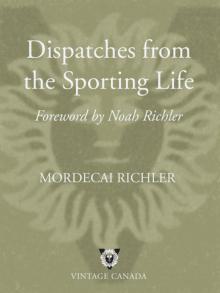 Dispatches From the Sporting Life
Dispatches From the Sporting Life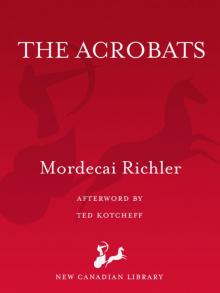 The Acrobats
The Acrobats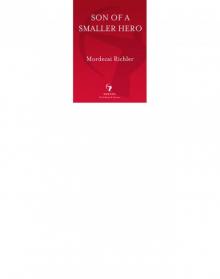 Son of a Smaller Hero
Son of a Smaller Hero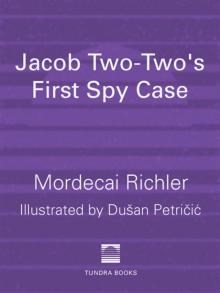 Jacob Two-Two-'S First Spy Case
Jacob Two-Two-'S First Spy Case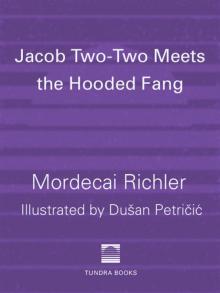 Jacob Two-Two Meets the Hooded Fang
Jacob Two-Two Meets the Hooded Fang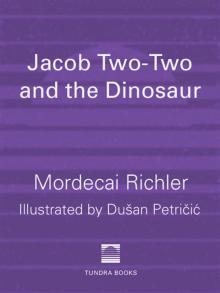 Jacob Two-Two and the Dinosaur
Jacob Two-Two and the Dinosaur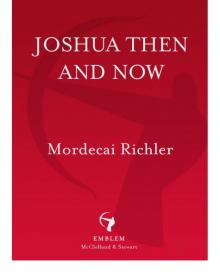 Joshua Then and Now
Joshua Then and Now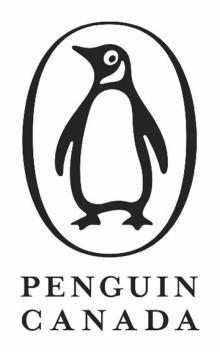 Solomon Gursky Was Here
Solomon Gursky Was Here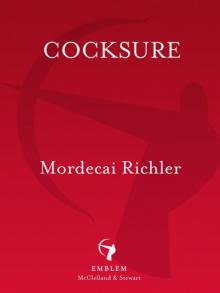 Cocksure
Cocksure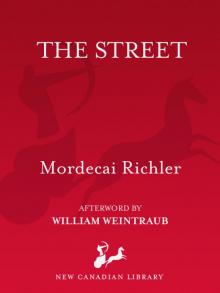 The Street
The Street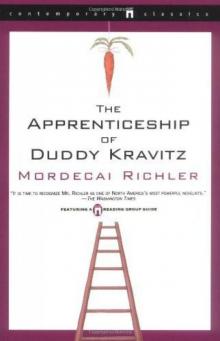 The Apprenticeship of Duddy Kravitz
The Apprenticeship of Duddy Kravitz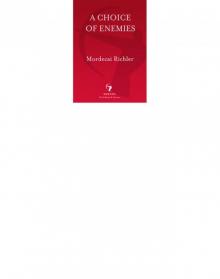 A Choice of Enemies
A Choice of Enemies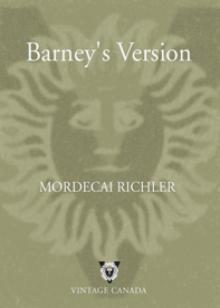 Barney's Version (Movie Tie-In Edition)
Barney's Version (Movie Tie-In Edition)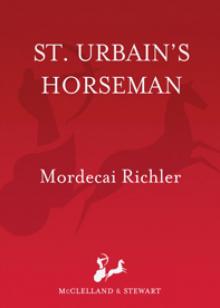 St. Urbain's Horseman
St. Urbain's Horseman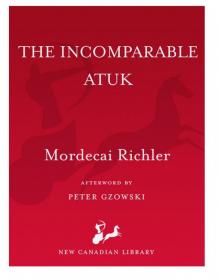 The Incomparable Atuk
The Incomparable Atuk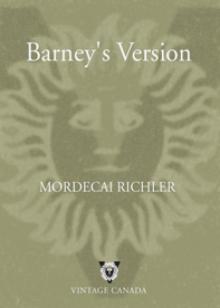 Barney's Version
Barney's Version